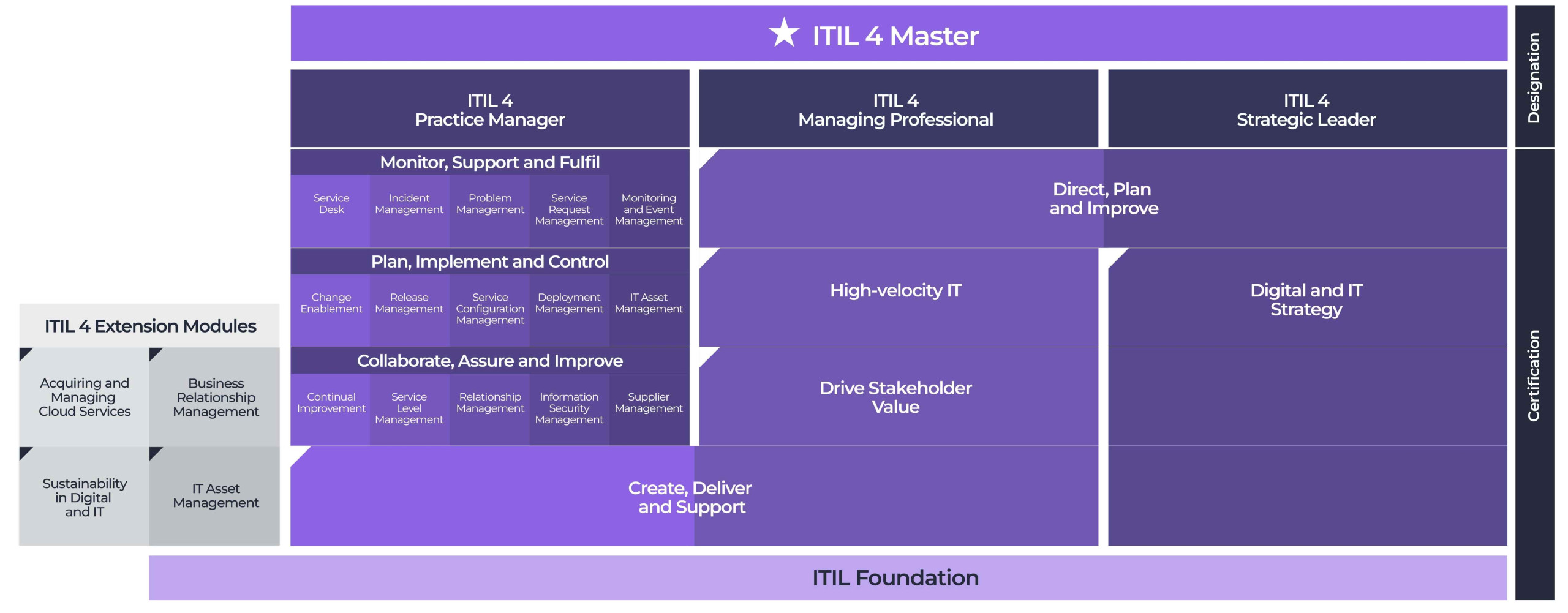ITIL 4
Certification
ITIL® is the most widely accepted approach to IT Service Management in the world.
The ITIL 4 certification scheme provides comprehensive, practical and proven guidance for establishing a service management system, providing a common glossary of terms for businesses using IT enabled services.

- A practical guidance to improve IT services
- Over 2 million ITIL certificates worldwide
- Onsite courses in 10 European cities
- Virtual and E-learning solutions
Courses
What is ITIL®?
ITIL is the most widely accepted approach to IT Service Management in the world, and is used globally by millions of practitioners.
For over 25 years, ITIL has been providing organisations with a practical guidance to improve IT services. ITIL is fundamental to businesses, enables transformation and helps organisations realize value.
The last version of the framework, ITIL 4, is built on established ITSM practices and expands itself to the wider context of customer experience, value streams and digital transformation, as well as embracing new ways of working, such as Lean, Agile, and DevOps.
ITIL 4 provides a practical and flexible basis to support organisations on their journey to the new world of digital transformation. ITIL provides an end-to-end IT/digital operating model for the delivery and operation of tech-enabled products and services and enables IT teams to continue to play a crucial role in wider business strategy.
ITIL 4 Certification Scheme
ITIL 4 provides training and certification in the following levels:
- ITIL Foundation
- ITIL Practice Manager
- ITIL Managing Professional
- ITIL Strategic Leader
- ITIL Extension Modules
- ITIL Master.

After the ITIL 4 Foundation certification candidates can choose between three different paths:
- ITIL Practice Manager (ITIL PM)
- ITIL Managing Professional (ITIL MP)
- ITIL Strategic Leader (ITIL SL)
The final designation, ITIL Master, will be awarded to candidates who achieve the Practice Manager (PM), Managing Professionals (MP) and Strategic Leader (SL).
1. ITIL Practices courses are intended for professionals that want to prove and validate their skills in specific practice areas or establish a good cross-practice collaboration and effective service value streams with practical assignments built into the courses.
To achieve the Practice Manager designation, you need to have completed 5 individual practices plus the ITIL Specialist: Create, Deliver and Support module (common module between ITIL MP and ITIL PM).
ITIL Practice Manager consists of fifteen practices courses, divided in 3 combined courses:
- ITIL Monitor, Support and Fulfil
- ITIL Collaborate, Assure and Improve
- ITIL Plan, Implement and Control
2. The Managing Professional stream provides practical and technical knowledge about how to run successful IT-enabled services, teams and workflows. ITIL 4 Managing Professional consists of four modules:
- ITIL Specialist: Create, Deliver & Support
- ITIL Specialist: Drive Stakeholder Value
- ITIL Specialist: High Velocity IT
- ITIL Strategist: Direct, Plan & Improve (common module between ITIL SL and ITIL MP).
3. The Strategic Leader stream recognizes the value of ITIL, not just for IT operations, but for all digitally-enabled services. Becoming an ITIL SL demonstrates that the individual has a clear understanding of how IT influences and directs business strategy.
ITIL 4 Strategic Leader consists of two modules:
- ITIL Strategist: Direct, Plan & Improve (common module between ITIL SL and ITIL MP)
- ITIL Leader: Digital & IT Strategy.
ITIL Training
QRP International is an accredited training organisation (ATO) for ITIL. Check our training formats and pick one that suits your needs or work best for your colleagues.
ITIL Benefits
- Supports organisations to keep pace with an ever faster and complex business environment
- Supports organisations to tackle modern challenges relevant not only for the IT Service Management professionals but also for the great number of professionals who work in the digital industry
- Supports digital transformation
- Helps processes improvement
- Helps teams work more collaboratively
- Brings more transparency between IT operations and development teams
- Enables automation
- Integrates new and emerging technologies and practices
Ask for more information
If you have any questions or would like to receive further information please do not hesitate to contact us using the form.
- 20+ years of experience
- 50,000+ professionals trained
- Only accredited training







